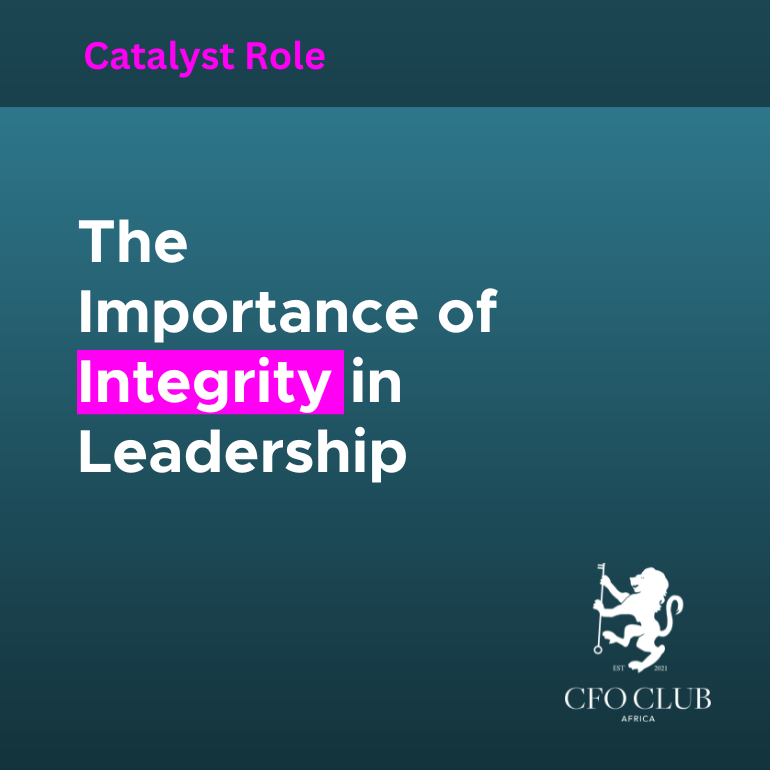The Importance of Integrity in Leadership
In the ever-evolving landscape of corporate governance, CFOs in South Africa play a pivotal role in shaping the ethical framework of their organisations. As stewards of financial integrity, CFOs are expected not only to manage the numbers but also to lead by example, embodying the values that define responsible and transparent leadership. Integrity, at its core, is non-negotiable in leadership—it builds trust, fosters accountability, and drives sustainable success.
Here’s how CFOs can integrate integrity into their leadership style and create a lasting impact.
1. Lead by Example: Walk the Talk
Leadership with integrity starts with consistency between words and actions. CFOs should demonstrate transparency in their decision-making processes, setting the standard for their teams. When senior leaders prioritise ethical practices, it encourages employees to follow suit. This can be as simple as adhering to financial reporting standards without compromise, even when under pressure to deliver positive results.
Establish clear ethical guidelines for your team, and consistently apply them in all financial decisions. Regularly hold yourself accountable by reviewing your actions against the company’s ethical framework.
2. Promote a Culture of Accountability
CFOs are responsible for ensuring that financial practices within their organisations are both legal and ethical. One way to reinforce integrity is by fostering a culture where accountability is the norm. Encourage open discussions about challenges and ethical dilemmas, allowing team members to raise concerns without fear of reprisal.
Introduce regular “ethics checks” during team meetings. These could be discussions on current financial projects, focusing on how decisions align with company values and ethical standards.
3. Ensure Transparency in Communication
In any organisation, financial transparency is crucial. CFOs should provide clear, accurate, and timely financial reports to all stakeholders. However, transparency goes beyond just the numbers. It involves communicating openly about risks, challenges, and any financial issues that could affect the organisation.
Maintain an open-door policy, where employees and stakeholders feel comfortable discussing financial matters. Additionally, ensure that financial reports are not just accurate but also easily understandable for non-financial stakeholders.
4. Implement Robust Internal Controls
Integrity in leadership is often demonstrated by the systems put in place to prevent unethical behavior. Robust internal controls that detect and prevent fraud, errors, and mismanagement reflect a commitment to integrity. CFOs must ensure these controls are enforced rigorously across all financial operations.
Regularly review and update internal control measures to ensure they remain effective. Conduct internal audits or assessments to identify potential weaknesses, and take corrective action as needed.
5. Encourage Ethical Decision-Making
In complex financial environments, ethical dilemmas often arise. CFOs need to guide their teams in making decisions that align with the organisation’s values. This involves training employees to assess not only the financial impact of decisions but also the ethical implications.
Provide ethics training for your team, focusing on real-world financial scenarios. Role-playing exercises can be particularly effective in helping employees navigate ethical challenges they may face in their roles.
6. Engage with Stakeholders Honestly
CFOs interact with various stakeholders, including investors, regulators, and customers. Maintaining integrity in these relationships is critical. Honesty in financial disclosures and openness about the organisation’s performance, both positive and negative, will build credibility and long-term trust.
When communicating with external stakeholders, ensure that financial reports and statements reflect the true position of the organisation, even when delivering less favorable news. It’s better to be honest and maintain trust than to compromise integrity for short-term gain.
7. Manage Conflicts of Interest Transparently
CFOs often encounter conflicts of interest, whether personal or organisational. It is essential to address these conflicts openly and take steps to manage or eliminate them. Ignoring potential conflicts can undermine the integrity of both the leader and the organisation.
Implement a conflict-of-interest policy that requires employees, including top management, to disclose any personal or professional interests that could affect their decisions. Ensure that these disclosures are reviewed regularly and acted upon appropriately.
8. Develop Ethical Leadership in Others
Leadership integrity should be nurtured across all levels of the organisation. As a CFO, one of your key responsibilities is to mentor and develop future leaders who will continue to uphold ethical practices.
Identify emerging leaders within your finance team and provide them with opportunities to lead projects or initiatives where ethical decision-making is a key component. Offer regular feedback on how they handle these responsibilities and help them grow into ethical leaders.
Conclusion: Integrity as a Strategic Asset
For CFOs, integrity is more than just a personal virtue—it’s a strategic asset. Leading with integrity not only strengthens an organisation’s reputation but also creates a culture of trust and accountability. CFOs who embrace this principle will find that it drives better decision-making, enhances stakeholder confidence, and ultimately contributes to long-term financial success.
By incorporating these practical steps, CFOs in South Africa can solidify their role as ethical leaders, ensuring that integrity remains at the heart of their leadership approach.

